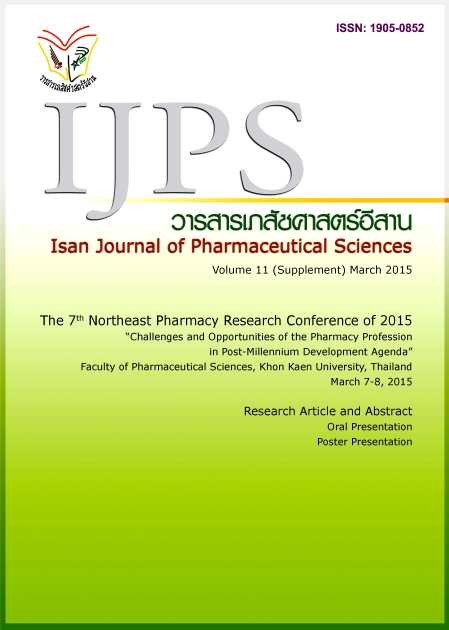Light exposure and sleep quality in students with different sleep patterns
Main Article Content
Abstract
Introduction: Low quality of sleep affects our health and quality of our life. University students are one group that has sleep behaviors that can cause sleep problems. This study investigated light exposure and sleep quality in students with different sleep patterns, classified as morning or evening types. Method: The study recruited pharmacy students at Khon Kaen University and screened for morningness/eveningness using the Morningness-Eveningness Questionnaire Thai-version (T-MEQ). A total of 14 students were selected (10 for morning and 4 for evening type) for further evaluations of sleep quality by using the Pittsburg Sleep Quality Index (PSQI), and sleep efficacy and light exposure by actiwatch. Data were analysed by software SPSS and Actiware analysis software. Results: The average of PSQI score in morning type was 4.21, which was better than the average of PSQI score for evening type (mean PSQI = 6.73). The sleep efficacy of morning type was 88.9%, slightly higher than average of sleep efficacy of evening type (84.4%). The onset latency (time to actually get to sleep after lights out) of morning type was 9.6 minutes less than that of the evening type (20.4 minutes). Patterns of sleep of morning types were more regular than evening types, and they were exposed to lower light at night than the evening group. Conclusion: The results indicate that chronotype, i.e. sleep pattern, does affect the quality and efficiency of sleep of university students. Larger sample size is needed to confirm the findings.
Article Details
In the case that some parts are used by others The author must Confirm that obtaining permission to use some of the original authors. And must attach evidence That the permission has been included
References
Buysse DJ, Reynolds CF 3rd, Monk TH, Berman SR, Kupfer DJ. The Pittsburgh Sleep Quality Index: a new instrument for psychiatric practice and research. Psychiatry Res. 1989, 28(2): 193-213.
Chonticha et al. Sleep problems fatique and work efficeincy amoung registered nurse at King Chlulalongkorn memorial hospitol. J Psychiatr Assoc Thailand. 2013, 58(2): 183-196.
Claustrat B, Brun J, Chazot G. The basic physiology and pathophysiology of melatonin. Sleep Med Rev. 2005, 9(1):11-24.
de Souza L, Benedito-Silva AA, Pires ML, Poyares D, Tufik S, Calil HM. Further validation of actigraphy for sleep studies. Sleep. 2003, 1; 26(1): 81-5.
Horne, J. A., Ostberg, O. A self-assessment questionnaire to determine morningness-eveningness in human circadian rhythms. International Journal of Chronobiology. 1976, 4(2): 97-110.
Jean-Louis G, Kripke DF, Cole RJ, Assmus JD, Langer RD. Sleep detection with an accelerometer actigraph: comparisons with polysomnography. Physiol Behav. 2001, 72(1-2): 21-8.
Killgore WD, Kahn-Greene ET, Lipizzi EL, Newman RA, Kamimori GH, Balkin TJ. Sleep deprivation reduces perceived emotional intelligence and constructive thinking skills. Sleep Med. 2008, 9(5): 517-26.
Lewy AJ, Wehr TA, Goodwin FK, Newsome DA, Markey SP. Light suppresses melatonin secretion in humans. Science. 1980, 210(4475): 1267-9.
Martin JS, Hebert M, Ledoux E, Gaudreault M, Laberge L. Relationship of chronotype to sleep, light exposure, and work-related fatigue in student workers. Chronobiology international. 2012, 29(3): 295-304.
Mecacci L, Zani A. Morningness–eveningness preferences and sleep-waking diary data of morning and evening types in student and worker samples. Ergonomics. 1983, 26: 1147–1153.
Meerlo P, Sgoifo A, Suchecki D. Restricted and disrupted sleep: effects on autonomic function, neuroendocrine stress systems and stress responsivity. Sleep Med Rev. 2008, 12(3): 197-210.
Plaimee P, et al. Comparison of Melatonin Levels, Sleep Quality and Alertness between Nurses Working Night Shift and Day Shift. Srinagarind Medical J. 2012, 27(4): 393-400.
Reiter RJ, Tan DX, Korkmaz A, Ma S. Obesity and metabolic syndrome: association with chronodisruption, sleep deprivation, and melatonin suppression. Annals of Medicine. 2012, 44(6): 564-77.
Strine TW, Chapman DP. Associations of frequent sleep insufficiency with health-related quality of life and health behaviors. Sleep Med. 2005.
Udomrat P, Yodprom P, Choosong T. Sensitivity and specificity of the Thai morningness eveningness questionnaire in relation to daily body temperature. J Psychiatr Assoc Thailand. 2007, 52(4): 352-367.


